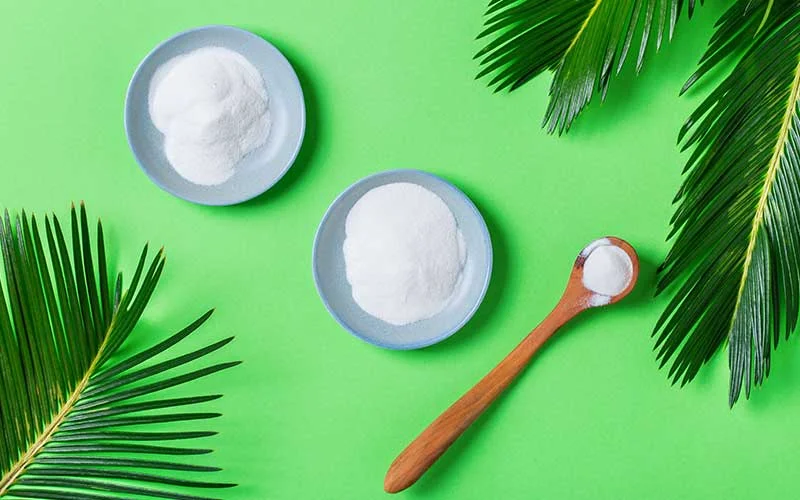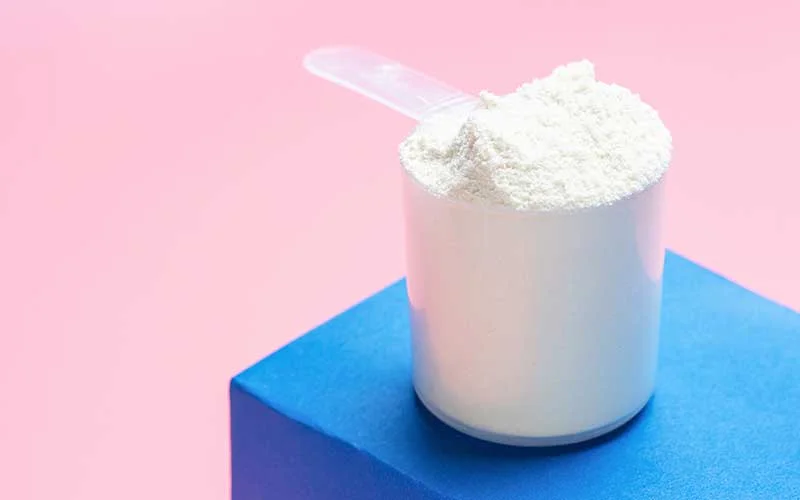Many people often confuse collagen with collagen peptides, leading to impulsive purchases without fully understanding their uses. Are you also one of them? Do not worry. This article will discuss different types of collagen peptides, what sets them apart, and how to use them effectively for the best results. Keep reading to learn more about the significance of collagen peptides. But first, let’s talk about what collagen is.
What Is Collagen?
Collagen is an essential protein that is important in maintaining the elasticity and flexibility of your skin. It makes up a whopping 75 percent of your skin and about 30 percent of the total protein in your body. This incredible protein is found in your skin, bones, muscles, and blood. It’s safe to say that collagen is the reigning champion as the most prevalent protein in your entire body.
The collagen structure resembles strong fibers, making it the building block of connective tissue. This special tissue lives up to its name by connecting various other tissues in your body. You can find it in important areas like your bones, skin, muscles, tendons, and cartilage. Thanks to collagen, our body can create robust, flexible tissues that can withstand stretching and other strains.
What Are Collagen Peptides and Their Importance?
Collagen peptides are an amazing supplement that’s been gaining much popularity lately! They work wonders in helping your body replenish lost collagen, which we all know plays a key role in keeping our skin, hair, and nails looking their best. It’s like a little boost of youthfulness in a bottle!
Now, let me break it down for you. Collagen is naturally present in our bodies, but as we age, its production slows down, leading to those pesky signs of aging we all want to avoid. That’s where these collagen peptides come to the rescue! They’re like a supercharged, easily absorbed form of collagen that quickly gets to work in replenishing what’s been lost.
Types Of Collagen and Collagen Peptides Supplements
The debate surrounding the number of collagen varieties in the human body is quite intriguing, especially in this information age where we have much to learn. It’s an incredible time to be alive! According to Mark Moyad, MD, from the University of Michigan Health System, the science of collagen is still in its early stages, and we are still determining a definitive answer.
Various scientific research suggests there might be sixteen varieties of collagen, while others propose up to 28 categories. The exact number remains uncertain at this point. Regardless of the specific number, we can all agree that collagen is undeniably awesome and essential for our bodies. We all desire more collagen, which is crucial to our health.
Five types of collagen are widely recognized and extensively used. Let’s discuss the most prevalent collagen varieties of Collagen peptides supplements:
Type I Collagen: Type I collagen is the most abundant form in the body and is primarily associated with maintaining collagen levels in the skin, hair, and nails. As you age, the levels of type I collagen start to decline, leading to issues like sagging skin, fine lines, nails, and thinning hair. However, it’s not just about appearance; type I collagen also plays a crucial role in supporting tendons, organs, and bones. Incorporating type I collagen into your diet or wellness routine is highly beneficial, especially for active individuals. Collagen peptides are primarily composed of type I collagen.
Collagen Type II: Type II collagen is another essential supplement type. While it is slightly less abundant than type I, it is crucial in supporting cartilage and promoting skeletal health. This makes it particularly valuable for individuals who rely on their joints, especially those with an active lifestyle. Our Cartilage collagen primarily consists of type II collagen.
Type III Collagen: Type III collagen also exists in collagen products like Vital Proteins. It is commonly found alongside type I collagen, typically in reticular fibers like bone marrow. Collagen Peptides and Marine Collagen from Vital Proteins are rich in types I and III collagen.
Type IV Collagen: Type IV collagen is a critical component of the basement membrane, a specialized layer that provides structural support and separation between different tissues and cell layers. This type of collagen is abundant in the layers of the skin, blood vessels, and the walls of various organs, playing a vital role in maintaining the integrity of these tissues. It contributes to the basement membrane’s overall stability and filtration functions, ensuring proper tissue function and preventing mixing of different tissue types.
Type X Collagen: Type X collagen plays a crucial role in bone formation and is naturally found in joint cartilage. However, no evidence suggests that consuming type X collagen supplements will directly promote the healing of injured areas. Naturally occurring type X collagen may have implications in diagnosing rheumatological disorders. Specifically, individuals with higher levels of type X collagen are more prone to rheumatological conditions that affect bone and cartilage. Certain companies marketing collagen supplements claim that type X collagen can aid in the recovery of limb injuries and fractured bones.
Key Differences Between Collagen and Collagen Peptides

Collagen and collagen peptides might seem the same at first glance, but they play crucial roles in our health, allowing us to move freely and maintain the body’s structure and flexibility. Collagen, the most abundant protein in the body, is vital for forming the body’s framework. On the other hand, collagen peptides are the digestible form of collagen, providing essential amino acids for healthy skin, bones, and joints. These amino acids aren’t easily obtained from regular protein sources like chicken, beef, or tofu.
The distinction lies in their digestibility. Collagen, in its whole form, is hard for the body to break down, whereas collagen peptides are much more accessible. Dietary supplements with hydrolyzed collagen, or collagen peptides, dissolve readily in liquids, making them easy to consume. This solubility advantage doesn’t apply to non-hydrolyzed collagen.
When you consume a whole collagen supplement, your body can only utilize a small portion compared to the higher bioavailability of collagen peptides. This increased bioavailability makes collagen peptides a better substitute for collagen.
To sum it up, collagen peptides are a specialized and more easily absorbable form of collagen, broken down into smaller fragments from the original protein. Their enhanced digestibility makes them an excellent choice for reaping the benefits of collagen in our daily lives.
How to Use Collagen Peptides?
Collagen peptides are a popular supplement known for their potential benefits to skin, hair, nails, and joint health. Following the manufacturer’s recommended dosage and instructions is essential when using collagen peptides.
Dosage and Serving Recommendations

Regarding collagen peptides, the appropriate dosage is crucial to achieve the desired results. While there is no one-size-fits-all approach, typical recommendations suggest adding 10-20 grams of collagen peptides to your daily diet. However, it’s essential to consult the product’s packaging or your healthcare provider for specific dosage instructions, as they may vary depending on the brand or formulation. Adhering to the proper dosage will ensure you make the most of collagen peptides without overconsumption.
Incorporating Collagen Peptides into Your Diet
Integrating collagen peptides into your diet is a convenient and versatile way to enhance your overall nutrition and potentially reap their health benefits. Collagen peptides, available in a flavorless powder form, can be effortlessly blended into various foods and beverages. There are also flavored collagen powders that can add enticing flavor to your shakes and baked goods. Below are some creative and enjoyable ways to incorporate collagen peptides into your daily meals:
Shake it: Mix 10-20 grams of flavorless collagen peptides into your favorite beverages like smoothies, coffee, or tea for easy and refreshing consumption.
Mix it: Sprinkle collagen peptides onto yogurt, oatmeal, soups, or sauces, effortlessly incorporating them into your meals for added nutrition.
Bake it: Get creative in the kitchen by incorporating collagen peptides powders into baked goods like muffins, cookies, or pancakes, giving your treats a healthy boost.
Chill it: Create collagen-infused cold treats like collagen popsicles or collagen-enriched gelatin desserts for a delicious way to enjoy collagen peptides.
Collagen Peptides vs. Other Collagen Supplements
Collagen peptides and other collagen supplements offer distinct differences and benefits, making collagen peptides a superior option. Also known as hydrolyzed collagen, collagen peptides boast easy absorption by the body due to their broken-down peptide form, making them highly bioavailable and exceptionally versatile for incorporation into various diets.
| Aspect | Collagen Peptides | Other Collagen Supplements |
| Source | Derived from animal collagen (typically bovine or fish). | Can also come from animal collagen or alternative sources like chicken, eggshell membranes, or plant-based options like marine collagen from algae. |
| Form | Usually available in a powder form. | Can come in various forms, including powders, capsules, tablets, and liquids. |
| Bioavailability | Highly bioavailable and easily absorbed by the body. | Bioavailability varies depending on the specific source and formulation, but may not be as easily absorbed as peptides. |
| Protein Content | High protein content, typically 90% or more. | Protein content can vary depending on the type and formulation, with some containing lower protein percentages. |
| Flavor and Odor | Generally flavorless and odorless. | Flavor and odor can vary depending on the source and any added ingredients. Some may have distinct tastes or odors. |
| Versatility | Can be easily incorporated into various recipes and beverages. | Other supplements may also be versatile, depending on their form and solubility. |
Choosing a High-Quality Collagen Peptide Product
Choosing a high-quality collagen peptide product is essential to ensure you get the maximum benefits for your health and well-being. Here are the key factors to consider when selecting a collagen supplement:
Ingredients & Sourcing: Check the label for collagen from healthy sources like grass-fed cattle or wild-caught fish without artificial additives.
GMP Manufacturing: Look for collagen made in facilities following Good Manufacturing Practices to ensure quality and safety.
Third-party Certification: Choose collagen supplements tested and approved by independent labs for purity and effectiveness.
Types of Collagen: Different collagen types have specific benefits; pick the one that matches your needs, like Type I for skin and Type II for joint health.
Added Ingredients: Some supplements have extra nutrients like vitamins or hyaluronic acid for enhanced benefits; ensure they’re safe for you.
Variety: Look for a brand with diverse collagen options, such as unflavored powders, flavored versions, capsules, or liquid formats.
Price & Value: Consider the cost per serving to find a product that offers a good balance of quality and affordability.
Brand Reputation: Research the brand’s background and read customer reviews to gauge their reliability and customer satisfaction.
FAQs
What Is The Best Source Of Collagen?
The best source of collagen is typically found in animal-derived products like bone broth, chicken, fish, and beef. Supplements containing collagen are also available.
What Is the Difference Between Type I and II Collagen?
Collagen Type I is the most abundant in the body and is found in the skin, tendons, and bones. Collagen Type I is mainly found in cartilage and is essential for joint health.
What Are The Sources Of Collagen Peptides?
Collagen peptides are usually sourced from the connective tissues of animals, such as fish scales, bovine (cow) hides, and chicken bones.
Which Type Of Collagen Is Best For You?
The best type of collagen for you depends on your specific needs. If you’re looking for overall skin and bone support, Collagen Type l supplements might be ideal. Collagen Type II supplements benefit joint health and cartilage support more. It’s best to consult with a healthcare professional to determine which type suits you best.
Final Thoughts
Collagen peptides is collagen broken down into smaller chains for better absorption. It’s popular as a dietary supplement for skin, joint, and muscle benefits. You can find it from different sources like cows, fish, or pigs, and it’s known for supporting skin elasticity, reducing wrinkles, and aiding in muscle recovery for athletes. Consult a healthcare professional before adding them to your routine, especially if you have medical conditions or allergies. Overall, incorporating collagen peptides into your routine provides a convenient means to help enhance your well-being, granting you the opportunity to achieve both an improved appearance and a heightened sense of vitality. Explore the variety of collagen peptide powders available to you.
RV Team
* Reviewology is in partnership or collaborates with top brands highlighted on this site, including those occupying the top ranking positions.
Additionally, we earn affiliate commissions from products showcased on this website when you make a purchase through the provided links on Amazon or the company website directly.
We appreciate your support using our links to purchase your favorite brands or newly discovered brands.
Latest updates
I Thought I’d Always Feel Tired, Fat, and Forgotten—Until This
310 Greens vs AG1
The Truth About 310 Greens: A No-Nonsense Review of This Popular Supplement
Popular
I Thought I’d Always Feel Tired, Fat, and Forgotten—Until This
310 Greens vs AG1
The Truth About 310 Greens: A No-Nonsense Review of This Popular Supplement
© 2024 Reviewology. All Rights Reserved.
